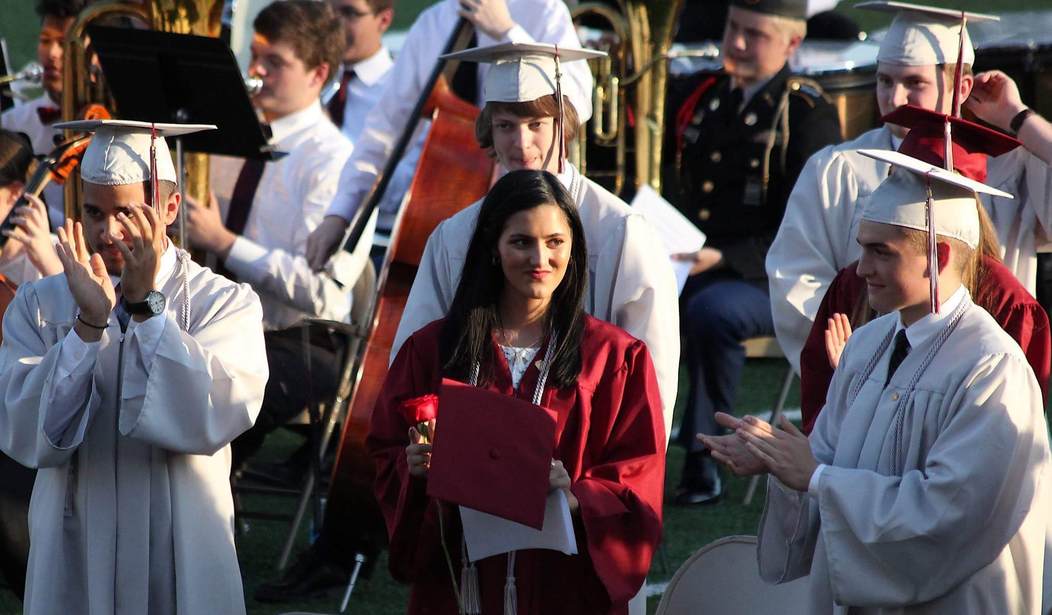When a graduating senior at a Pennsylvania high school submitted her planned remarks for a graduation speech, she received an email response, saying any references to faith in her proposed speech were “not permissible by federal law.”
“I was shocked that the school said my personal remarks broke the law and saddened that I could not draw upon my Christian identity to express my best wishes for my classmates on what should’ve been the happiest day of high school,” Moriah Bridges, a Christian student at Beaver High School in Beaver, Pa., said in a statement.
But the school district was wrong — Bridges wasn’t breaking the law, the school district was! Not only does the First Amendment protect Bridges’ free speech, but the U.S. Department of Education (DOE) set forth clear guidelines specifying that religious expression at graduation ceremonies is indeed acceptable.
“Why is the superintendent denying the U.S. Department of Education guidelines?” asked Jeremy Dys, at attorney at First Liberty, in a statement to PJ Media. First Liberty sent a letter to the superintendent and to the school board on Tuesday, requesting a formal apology and a meeting to make sure this never happens again.
“We are confident that once the school officials read the U.S. Department of Education’s guidelines, they will change their policy,” Dys told PJ Media.
Those guidelines are remarkably clear:
School officials may not mandate or organize prayer at graduation or select speakers for such events in a manner that favors religious speech such as prayer. Where students or other private graduation speakers are selected on the basis of genuinely neutral, evenhanded criteria and retain primary control over the content of their expression, however, that expression is not attributable to the school and therefore may not be restricted because of its religious (or anti-religious) content.
But in an email to Bridges, Beaver Area School District Superintendent Carrie Rowe explicitly rejected the DOE guidelines. Here are her words:
The ceremony contains two instances of invocation/prayer/benediction; this is not permissible by federal law, as prayer (even student-initiated prayer) has been held to be unconstitutional by the Supreme Court as a violation of the Establishment Clause.
The selected students may still address their class and indicate the things that they wish/hope for their class, but they may not do it in the style of a prayer and most certainly may not recite a prayer that excludes other religions (by ending “in the name of Our Lord and Savior, Jesus Christ” or “in the matchless name of Jesus”).
Rowe’s interpretation only works if Bridges’ remarks were to be considered “attributable to the school.” As the DOE guidelines make clear, however, Bridges’ remarks are not considered official school speech, and therefore not restricted by the Establishment Clause, which forbids government endorsement of religion.
A student’s religious graduation speech is fully “permissible by federal law,” for many reasons. First Liberty’s letter cited numerous legal precedents, including the Supreme Court case Tinker v. Des Moines Independent Community School District (1969), which held that students do not “shed their constitutional rights to freedom of speech or expression at the schoolhouse gate.”
Again, in the 2000 case Santa Fe Independent School District v. Doe, the Supreme Court declared that “nothing in the Constitution … prohibits any public school student from voluntarily praying at any time before, during, or after the school day.”
The practice of a school district editing, controlling, and censoring student speech due to its religious viewpoint is unconstitutional.
“In short, school officials—in violation of the First Amendment—forced Moriah to censor her personal remarks during the closing exercise of her commencement ceremony merely because of the religious viewpoint of her remarks,” the First Liberty letter declared. Since Bridges’ remarks were her own private speech, rather than government speech, she had the freedom to say whatever she wanted, no matter how religious. Therefore, the district’s action constitutes “unlawful viewpoint discrimination.”
The damage has already been done to Bridges, but she expressed hope that First Liberty’s letter would prevent other students from facing the same dilemma in the future. “I hope the school district will realize their mistake and make sure future students never have to go through this again,” she said.
“School officials should remember that students retain their constitutional rights to freedom of expression from the schoolhouse gates, all the way through the graduation ceremony,” Dys declared.
While the American Civil Liberties Union (ACLU) and other anti-religious expression groups have attacked towns for putting up Christmas trees or coaches for tweeting Bible verses, attacking students and censoring faith from their graduation speeches is new. This should be the one and only case.
Americans should not let secularism encroach upon the right to free speech. This case demonstrates just how far some will go to shut down religious expression in the public square, and no matter their faith, Americans should not stand for it.
In her actual remarks, Bridges disobeyed the school district, declaring that “in the spirit of defying expectations … I say in the matchless name of Jesus Christ, amen!” In a final rebuke to the school district’s unconstitutional attack on free speech, the students cheered at this defiance.
Click “Load More” to see Bridges’ actual remarks at the event.









Join the conversation as a VIP Member